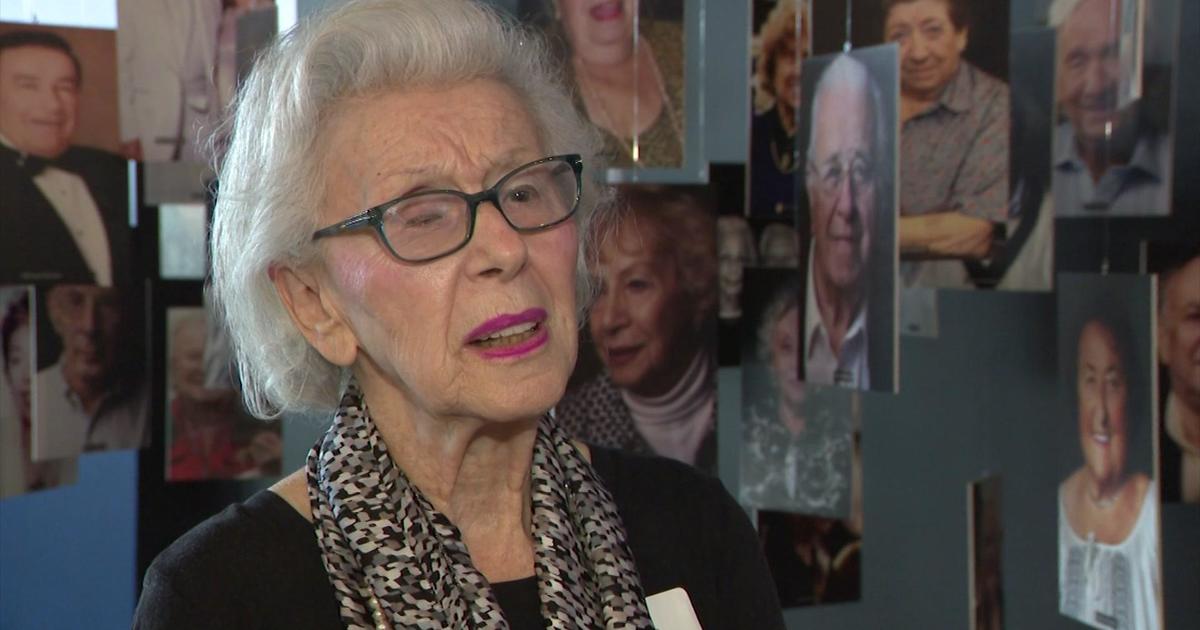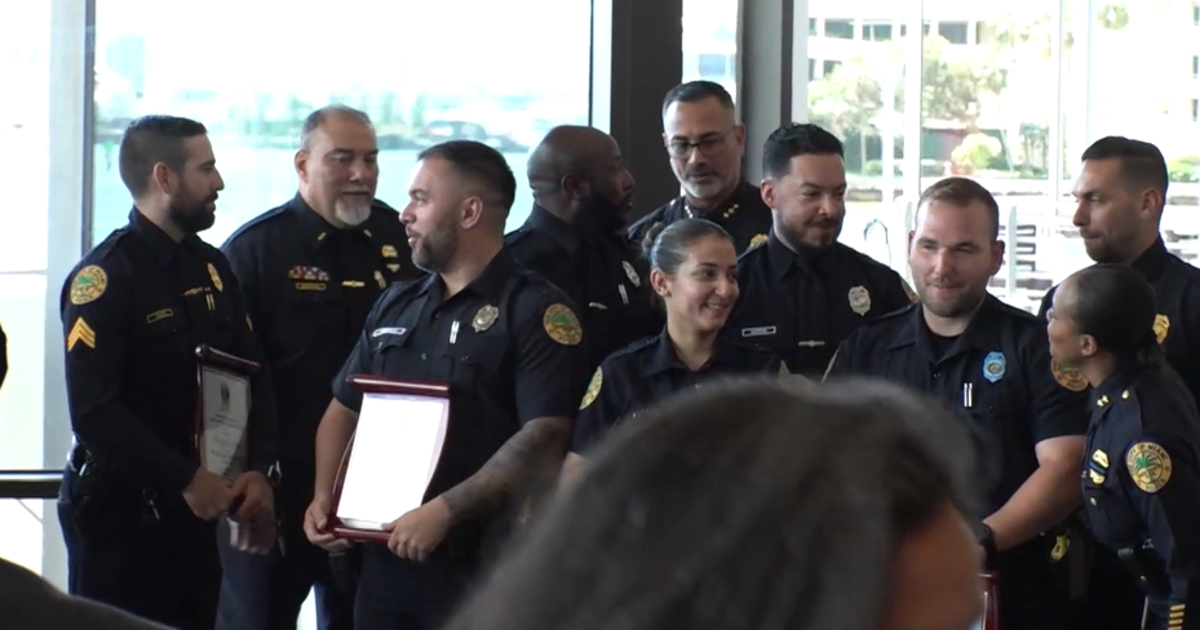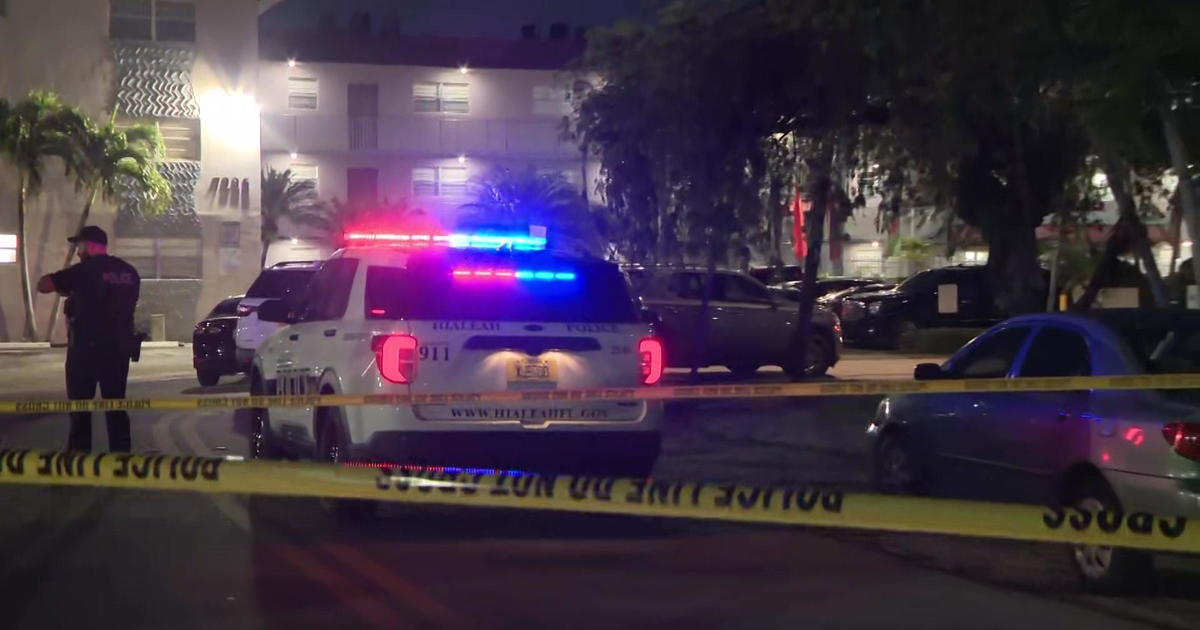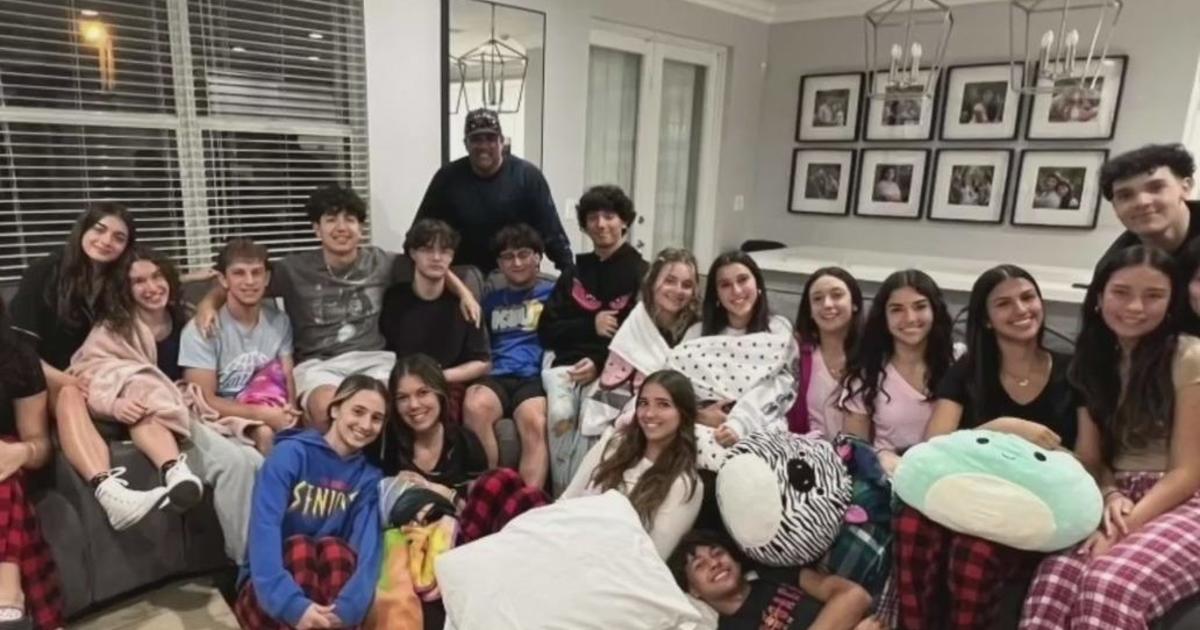Jimmy Buffett Looks At 50 Years After His 1st Key West Gig
MIAMI (AP/Miami Herald) - As The Miami Herald's Howard Cohen recalls, a profane phone call and Jimmy Buffett's inability to keep his daily planner organized 50 years ago in Miami set in motion events that changed the music world.
Those events made the singer-songwriter one of the most beloved entertainers in America. And one of the wealthiest, with a net worth around $600 million.
Buffett's music and business empire includes restaurants, casinos, hotels and beach resorts, a retirement village, a cruise liner, clothing, publishing. And 29 studio albums, and as many live albums and compilations combined, plus a handful of books.
The unusual events — unusual for perhaps everyone except for the creative mind that gave the world "Margaritaville," "Havana Daydreaming" and "Everybody's Got a Cousin in Miami" — also helped brand Key West as a distinct sound of music and a destination known the world over.
"I was able to make a living and live how I wanted to and then all of a sudden things started getting better," Buffett said in a telephone interview from his home in Palm Beach County.
Photographer and author Tom Corcoran was with Buffett at the very beginning when the "struggling young hippie" cast his voice and acoustic guitar loose on Duval Street and Mallory Square with a handful of good early tunes, like "Railroad Lady," which Buffett wrote with Jerry Jeff Walker, and "The Captain and the Kid."
Corcoran documented Buffett from the start in the early 1970s. His photos as the pair wandered about the Keys on gig days and social outings around the world adorned album cover artwork on packages including "Havana Daydreaming," "Changes in Latitudes, Changes in Attitudes," "Son of a Son of a Sailor," "You Had to Be There: Recorded Live" and "Volcano." His images from the Keys years fill video screens to this day at Buffett concerts.
"Essentially, I took decent pictures and I was cheap. And I knew how to sail a sailboat. So I was good to have around," Corcoran joked in a phone interview from his home in Lakeland. "I had no great delusions about my artistry as a photographer, but all I knew was that I had opportunity and that was huge."
A COLLEAGUE LOOKS AT 50
"It's just like the longevity of mischief," Corcoran says in explaining the significance of Buffett's career after six decades, a career that went full throttle after that fateful car ride to the Keys circa November 1971 or early 1972, depending on who's minding the calendar.
"Or, how long will a smile last? That's what he's been peddling all this time. His lyrics have been brilliant from time to time. Sometimes they're just like, 'Oh, Jimmy, why did you do this?' But when he was hitting them, gosh. I mean, 'Cowboy in the Jungle.' I could listen to that one over and over and over and over again. And 'Sending the Old Man Home,' that song from the 'Volcano' album. You know, they're just exquisite lyrics. And good melodies to go with. What he promised and what he delivered were the same thing. It was fun. And it was concerts and live performance. And the live album really got it right," Corcoran said.
"When I really knew he was going to make it a business was probably in the spring of '77. I was with him when he discovered that 'Margaritaville' was a hit and it was climbing the charts," Corcoran said.
The pair were in Staniel Cay, an island in the Bahamas, when they came upon what was essentially the only phone on the island inside a little concrete block building. Buffett picked up the phone and called his management. Collect.
Buffett had had some well-received albums like "Living and Dying in ¾ Time" that featured his first Top 40 hit, "Come Monday," in 1974. "A1A" and "Havana Daydreaming" followed by 1976. These records were part of his formative "Key West Period" albums. But the latter two didn't yield any radio hits.
"Changes in Latitudes," generally considered the last of the "Key West Period" albums, had just come out in January 1977. (Though an argument could be made, stylistically, for the subsequent "Son of a Son of a Sailor" he recorded with his Coral Reefer Band at the defunct Bay Shore Recording Studio in Coconut Grove.)
"He said, 'Let me call LA. See if I still have a job.' That is the exact words: 'I'm going to call LA and see if I still have a job,'" Corcoran recalled. "They just recorded 'Changes in Latitudes' at Criteria Studios in November and December 1976. And he got a modest advance from ABC/Dunhill at that point. And he wondered if his career was going to go up in smoke after only four albums and now maybe a fifth. And so he pledged that advance would go to a sailboat so he could at least sail away from the dock and flip the bird back at the people who decided he wasn't worthy of a career.
"That changed the day that he found out 'Margaritaville' was Number 29 and climbing."
A SONGWRITER LOOKS AT 50
"What got me to Key West, of course, was Jerry Jeff Walker because I had left Nashville, gotten a divorce, and nothing was going on there," Buffett said. "But I was working, booking myself in places or through word of mouth on the folk circuit around the South and the Southeast. The great Gamble Rogers, people like that there, were on that circuit through Nashville, the Carolinas, St. Augustine, the Flick and Bubba's in Miami. So I climbed my way up on that circuit and one of the places there was The Flick, so I had an offer to go to Miami for The Flick."
The Flick coffeehouse itself is long gone, closed in 1974, a decade after opening. Today, The Flick location is the Titanic Restaurant and Brewery, across from the University of Miami's baseball stadium on Ponce de Leon Boulevard in Coral Gables. But in its mid-'60s, early '70s heyday, The Flick was where rising talents in the acoustic folk, pop and rock fields like Buffett, Joni Mitchell and her ex-husband Chuck Mitchell, David Crosby, John Denver, Michael Martin Murphy, Bobby Ingram and Walker honed their skills before welcoming audiences.
"After the first album came out I went touring across the U.S. but until '72 I was basically staying alive by working gigs in South Florida," Buffett said.
"I met Jerry Jeff when I was a reporter for Billboard magazine in Nashville," Buffett said. "l had done a story on him and he actually wound up staying at my house and we got a little — we got very — drunk that night. So much so that he was calling home in those days. The operator came on and he was using profanity to his girlfriend or something. They cut my phone off.
"The phone company called me in the morning, and I had a hangover, and they said, 'Are you ready to behave or what?' Jerry Jeff said, 'I'm sorry, Ma'am. If you ever get to Miami and I can do anything for you let me know.'"
Buffett chuckles at the memory. We'll never know if Jerry Jeff delivered on his promise to the insulted operator. The country songwriter behind the 1968 classic "Mr. Bojangles" died in 2020 in Texas at age 78. But he was about to change Buffett's fortunes forever.
"Cut to Miami. I got this job. I called Jerry Jeff and said I was in town and I'm working at The Flick," Buffett said. He was the opening act on a five bill act that included Fred Neil and Vince Martin.
"I went in to the club to go to meet the owner and he said, 'No, it's not this weekend.' I went, 'No, it has to be because I don't have any other job!'"
GOING TO KEY WEST
Buffett had no money. And no place to stay in Miami. But he had Jerry Jeff Walker.
"He said, 'Come stay with me.' So I stayed with him and (Teresa) Murphy (Sadler), his girlfriend at the time in Coconut Grove and for two weeks was helping him work on his car. We've finished working on the car and he said, 'Come on. Let's go to Key West. Have you ever been? And we'll be back in town for that show.' So we got into a 1947 Packard and drove to the Keys," Buffett said.
Buffett, 75, who was born on Christmas Day 1946 in Pascagoula, Mississippi, and raised in Alabama, earned his bachelor's degree in history from the University of Southern Mississippi in Hattiesburg.
Buffett said he had been as far down as Islamorada in the Florida Keys during his college years. But when the shaggy-haired struggling singer looked out the car window when the southbound Packard got beyond Islamorada, Buffett's mind raced.
"From Islamorada down I was just like, yeah, riding on a bridge on the ocean. For someone who grew up on the Gulf Coast, I thought this is the most amazing, longest bridge in the world," Buffett said. "I knew the history of the Flagler railroad from that point. But when I left Islamorada on U.S. 1 and got to Key West, going over the Bahia Honda Bridge and the Seven Mile Bridge and looked, I was going, 'What is this place? I don't know what it is but I like it!'
"When I got there Jerry Jeff basically dropped me off, introduced me to a few people around, and I quickly got a job at a place called Howie's Lounge that's not there anymore," Buffett said.
Howie's Lounge used to be at 109 Duval St., a few blocks from where Buffett opened his flagship Jimmy Buffett's Margaritaville restaurant and gift shop at 500 Duval in 1985.
He played the cocktail hour, from 5 to 8. "That bar was like an oasis," Buffett remembers. "I got a job as a mate on a fishing boat so I played by day, go raise hell all night, sleep for a few hours, and then get up at 4 o'clock in the morning and go catch fish. So I thought, "I have got this made. This is pretty cool!' Buffett said.
Buffett's first actual performance in the Keys was at Crazy Ophelia's before moving up to Howie's Lounge and then The Chart Room, he said. He started to meet integral figures at these local Keys joints who would figure prominently in his life like American writer Thomas McGuane (who married Buffett's sister, Laurie, in 1977) and Tom Corcoran, who would share writing credits on Buffett's songs, "Cuban Crime of Passion" from Buffett's third album and first proper Key West LP, "A White Sport Coat and a Pink Crustacean" in 1973. Corcoran also shared a songwriter's credit on "Fins" in 1979.
At the time, Corcoran, who had arrived in Key West in 1970, was a bartender at The Chart Room and he had known Walker for about two years before he met Buffett.
FINDING HIS HOME
"I was the bartender maybe 4 in the afternoon," Corcoran said. "I hadn't seen Murphy or Jerry Jeff for maybe a few months. And they had this sort of struggling young hippie with them. And they introduced him. It was Jimmy Buffett, and, you know, nobody, nobody could make out the last name — Jimmy Bumfum. But anyway, I wanted to be the genial host and I said to Jimmy, 'What are you drinking?' And he kind of got this look in his eyes that said, 'Well, I wonder who's paying?' And I read that and I said, 'First one's free. Welcome to Key West.'
"So he ordered a Heineken and we yakked for a while on this and that and they said, 'Oh, Jimmy's down from Nashville. He's a singer-songwriter, too.' 'Oh, cool.' So that was my first meeting with Jimmy. Served him his first beer — and it was a freebie, which is, I'm sure, one of the reasons he stuck around."
A week or two later Buffett returned to Key West from Coconut Grove and had fallen in love with the island, Corcoran said. "He came to me in the bar one afternoon, he said, 'You think I can play for drinks?' I made this pretense of going out to talk to the owner and so I came back and I said, 'Well, I guess you're good to go.' When I went to get him a Heineken, he said, 'No, I'll take a Crown Royal on the rocks.' And so I went, 'Oh, this guy's going places. First time I knew that this guy is going places."
It wouldn't be the first time Buffett impressed his new pal.
"He was good. He'd already sung a few songs, 'Railroad Lady,' 'The Great Filling Station Holdup' and stuff like that," Corcoran said of two songs that would open Buffett's first major label album, "A White Sport Coat and a Pink Crustacean." Though recorded in Nashville, it was Buffett's first true Key West-inspired and flavored album and featured staples like "He Went to Paris," "Grapefruit — Juicy Fruit" and "Why Don't We Get Drunk."
Buffett's catalog would come to document the Keys and its characters in song on later cuts like "A Pirate Looks at 40" and "Migration" and "Woman Goin' Crazy on Caroline Street" and "Last Mango in Paris," the latter written in 1985 about Captain Tony Tarracino, a colorful saloon keeper, storyteller and mayor of Key West from 1989 to 1991.
"He's quite clever. And the lyrics, obviously, when he wrote his own songs, he was telling his own stories," Corcoran said. "And he was right out on the edge, talking about shoplifting, and this and that. And then songs that he sang that were written by other people just sort of help get you a reading of where his head was at. Willie Nelson's 'Me and Paul' was a favorite of his. 'Danny's Song' by Loggins and Messina. All the girls loved that one."
CHANGES IN LATITUDES, ATTITUDES
Key West, of course, was different in those days. Today, for instance, Buffett's private studio in the Key West Historic Seaport area has turned out music for his own albums ever since "Hot Water" in 1988. And he's opened the waterfront studio to pals like Coral Reefer Mac McAnally, country stars Toby Keith, Alan Jackson, Zac Brown, Kenny Chesney and George Strait, and Smashing Pumpkins' rocker Billy Corgan.
The national Rams Head Presents, based in Maryland, with locations in New York, Maryland and Delaware, produces numerous concerts and theatrical performances in the Keys from contemporary and vintage artists and locals at venues like Key West Theater, Key West Amphitheater and Sunset Green. Coming shows include The Mavericks, Max Weinberg's Jukebox, Livingston Taylor, David Sanborn, Rickie Lee Jones, The Four Tops, Colin Hay, Al Stewart and Chris Young.
"The music scene in Key West, let's face it, when I got there in '72, it wasn't a music scene. If you got a job in a bar, that was a music scene," Buffett said. "It's changed a lot and I think most of it for the better.
"And I'm really kind of involved now with the people of Rams Head," Buffett said. "They are there for the right reason. We made a deal with our studio to use it more and to connect Shrimp Boat to their existing other studios in Los Angeles and New York. Their ideas are to be able to teach and make it available to local kids who are interested and to local performers. But also to look at their already web of people that record in their studios who would want to come to Key West to record and adding that to the mix.
"For years, there were two or three little theaters in Key West. It always had this great artistic side to it. Back even in the day as far back as the Hemingway days there was always entertainment, so much culture, and Key West has always had that. But music was never at the forefront. It's like handing it off to them and I started it and carry on. I'm glad that I lived to see this and be a part of this coming back," Buffett said.
Buffett's level of success and the attention it eventually brought to the southernmost point of the U.S. did lead to a bit of a backlash, Corcoran believes.
"A lot of people blame Jimmy for what has, quote, happened to Key West. And there are two facts that we always have to bear in mind. And that is that Key West, ever since the railroad fell in the drink and they had to build a highway, they were begging for tourists to cross the Seven Mile Bridge. A joke was that during a gas crunch in the early '70s, the Chamber of Commerce put people on the Seven Mile Bridge to call ahead if somebody drove over so everybody could race downtown and open up their gift shops," Corcoran said.
"It wasn't until the '80s where Jimmy had the sway to get people to actually take a vacation in Key West. But real estate people were desperate. The people who own businesses were desperate. They really wanted tourists. Well, then they got them. ... And so a lot of newcomers who've only hit Key West in this century, for example, since the turn of the millennium, they tend to blame Jimmy for adding hotels and having gift shops. The island was begging for tourists to start with."
ONE PARTICULAR HARBOR
But 50 years ago, despite less emphasis on the music side, Buffett found plenty of inspiration in Key West.
"The mixture was so incredible, you know. It was still a Navy town. It was a gay town. It was a hippie town. It was a local fisherman's town. You want a melting pot? It was just that. It never ceased to give me ideas or hear stories from which those first songs came," Buffett said.
Despite the non-response to his music in Nashville, where his first album in 1970, "Down to Earth," sold a reported 600 copies nationwide, and a second in 1971, "High Cumberland Jubilee," went unreleased for five years, he got a call from his then-manager, Don Light. Buffett was told that his songs had been sent to Don Gant who was running ABC/Dunhill in Nashville.
ABC/Dunhill had hit big with mentoring singer-songwriter Jim Croce, who died in a plane crash in 1973, and Three Dog Night. Gant liked Buffett's Key West tunes.
"And that got me a record deal," Buffett said. "So I had to do the album of all those songs I'd written in Key West and that was 'White Sport Coat' and we recorded it in two days for $8,000. And I got a $20,000 check, more money than I'd ever seen in my life. And with the rest of the $20,000 — 12 grand — I bought a 33-foot sailboat and I said, "This is my insurance policy and I can sing and I can write and I can sail so that if all this goes to hell at least I can see the rest of the world. I got a boat."
WE ARE THE PEOPLE OUR PARENTS WARNED US ABOUT
In the intro to "Wonder Why We Ever Go Home" from his landmark 1978 live album, "You Had to Be There," Buffett plugs that summer's raunchy flick, "National Lampoon's Animal House." He equates the happenings at the fictional Delta House frat house from the movie with life on the road with the touring Coral Reefer Band in the high (literally) flying 1970s.
"We all sat in a balcony in Miami and saw 'Animal House' last week," Buffett tells his rowdy audience inside Atlanta's Fox Theater where parts of the album were recorded. (The rest was cut during a series of August 1978 concerts at downtown Miami's Gusman Cultural Arts Center.) "Gotta see that movie, gotta give Belushi a plug. That's a hot movie, you'll all like that. Reminds me of the life story of this band."
With its apt description of what touring was like in that era or the drug references in an added verse to "Margaritaville" on "You Had to Be There" — God I still feel bad/I wish I had some cocaine/But that's been gone since early this morning — Buffett was clearly no longer a choirboy.
But Buffett wasn't entirely removed from the Catholic upbringing and resulting high school parochial education his parents ensured he'd follow while growing up in Alabama.
This dichotomy struck Corcoran, too, in the early days and tipped him to the fact his Key West buddy was no ordinary rock and roller. Buffett, not yet an industry unto himself, minded the business as well as he tended to the music.
"We were out on the tour and the first one of the first gigs. They had hired a bus driver and then they leased a Winnebago for the sound and light people and they hired some other guy with a chauffeur's license to drive that. And on one of the early gigs on the tour the FBI showed up and arrested the bus driver. Well, they had to move the Winnebago driver into the bus to stay legal. Winnebago didn't require a chauffeur's license. So Jimmy called me into his hotel room and said, 'Would you mind?' So, I drove the Winnebago," Corcoran said.
After about two long hauls and several gigs after Corcoran had been pressed into the job, he was called into Buffett's hotel room. Buffett asked him what it was like driving the Winnebago.
"And I said, 'Well, you've been in men's locker rooms before. You smell those old socks? You know what it smells like. It's just another vehicle that smells like a locker room," Corcoran said.
"He summoned his road manager, Michael Wheeler at that point. And said, 'Take all the petty cash. Go to every drugstore in a five-mile radius and buy every Odor-Eaters in town and give them out to the crew and the band and tell him the first one's free. And from now on, they're mandatory.'
"I thought to myself, you know, I majored in business in college. And I thought that that's a business decision. That's huge. That's foresight. I mean, how many rock and rollers would want the bus to smell better?"
(© Copyright 2022 The Miami Herald/AP. All Rights Reserved. This material may not be published, broadcast, rewritten or redistributed.)



